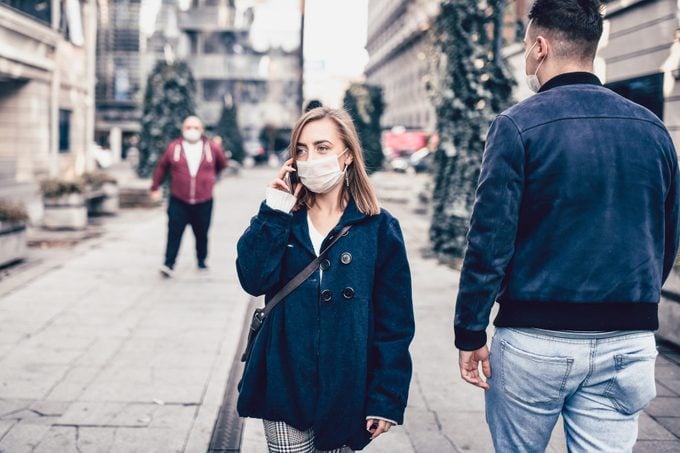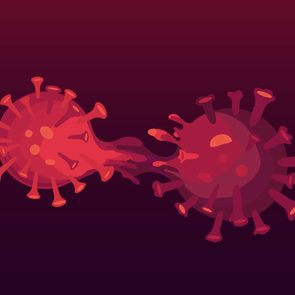The New COVID-19 Variant, “BA.2″—Get 9 Facts Straight From Medical Specialists
Updated: Mar. 29, 2022
BA.2, the new Covid-19 variant that's also referred to as "stealth Omicron," is spreading in the U.S. with the highest contagion rate yet. Help yourself stay ahead with wisdom from our medical experts.

The Omicron Covid-19 variant that emerged in recent months has been considered the most contagious strain of Covid-19 virus to date. Now, just as mask mandates are being lifted and in the wake of Omicron’s most severe surge, comes a new Covid-19 variant—known as BA.2—that medical experts suggest may be even more transmissible than Omicron.
Also referred to by nicknames such as “Omicron’s cousin,” “son of Omicron,” or “stealth Omicron,” BA.2 is now spreading in the U.S. with virulence patterns that seem to mimic its recent spike in Europe. As science continues to gather intel on BA.2, medical experts spoke with The Healthy to share some of their knowledge as it evolves in real-time.
“Is it possible I’ve been infected with Covid, but didn’t know it?” Here are 14 signs you may have already had Covid-19.
Experts say BA.2 will soon be the dominant Covid-19 variant in the U.S.
This insight is straight from White House chief medical adviser, Dr. Anthony Fauci. At press time in late March 2022, BA.2 made up about 30-plus percent of all Covid-19 cases in the U.S., and this number was quickly rising.
Despite these statistics, Fauci has stated that he does not anticipate a surge like we saw this winter with Omicron.
It’s more contagious than Omicron
Yes, BA.2 is more contagious than Omicron due to its “transmission advantage,” explains Len Horovitz, MD, a pulmonary specialist with Lenox Hill Hospital in New York City. “BA.2 is thought to be about 30 percent more transmissible than BA.1, which itself was more transmissible than the Delta variant,” he says. [Editor’s note: “BA.1” refers to the Omicron variant.]
BA.2 likely won’t cause severe disease…if you are fully vaccinated
“Likely” is the operative word here, as researchers are still analyzing data on BA.2 in real-time. For now, says Jasmine Plummer, PhD, assistant professor of biomedical sciences at Cedars-Sinai: “BA.2 is very similar to Omicron (BA.1), and we have a lot of data now to support that Omicron does not link to severe disease in those that are vaccinated.”
Dr. Horovitz agrees: “It’s a mild disease and mostly causes upper respiratory symptoms and sore throats for people who are fully vaccinated and boosted.” So far, BA.2 doesn’t seem to invade the lungs the way that previous Covid-19 variants did, which he suggests may be encouraging. “The overarching hope is that this virus is evolving in a way that it is becoming milder and milder and may join the pantheon of common colds and other Coronaviruses … for the vaccinated.”
“This is why you should care” about BA.2, an infectious disease doctor says
Yes, we all want to return to our maskless and test-free “normal,” but it’s important to keep a heads-up to the BA.2 Covid variant, says Sabrina A. Assoumou, MD MPH, an assistant professor of medicine at Boston University School of Medicine and an attending physician in infectious diseases at Boston Medical Center. “BA.2 is a subvariant of Omicron, and we know it is more transmissible than Omicron (BA.1), which was actually one of the most contagious variants we have seen. This is why you should care,” she says.
And, a reminder: Getting your Covid-19 booster if you’re eligible can help lessen your chances of getting seriously sick from a BA.2 Covid-19 infection.
You can get BA.2 if you had Omicron
Yes, you could get reinfected with BA.2 even if you already had Omicron. The good news? It appears unlikely. “From an overall population level, it is unlikely because of the time course of having Omicron and residual protection from your last infection,” says Plummer.
There probably won’t be a large percentage of the population infected with BA.2—but of course, the one thing we know for sure about Covid-19 is that trying to predict its path can be a fool’s errand.
BA.2 may follow the same pattern seen in Europe right now
Parts of Europe are now experiencing high numbers of cases: That’s the bad news. “Cases are going up in Europe, and that tends to foreshadow what we see here a couple of weeks later,” says Dr. Assoumou.
The glass-half-full news is that death rates from Covid-19 are declining significantly. “The pandemic is not over,” Dr. Assoumou says, “but we are in a better place than we were in 2020.”
Unvaccinated people are at highest risk for severe BA.2 infection
Those at greatest risk for severe BA.2 are unvaccinated individuals and populations. “The Covid-19 vaccine protects against severe disease but not breakthrough infections, similar to what was seen with Omicron,” Horovitz says.
Covid-19 boosters may offer an added layer of protection. Further, the Food and Drug Administration (FDA) advisory panel will meet on April 6, 2022, to discuss a fourth Covid-19 vaccine dose. Currently, people in the U.S. with moderately or severely weakened immune systems are eligible for a fourth dose.
Read up on 10 Covid-19 vaccine myths no one should fall for.
Other prevention measures can help protect you from BA.2
Horovitz says masks, social distancing, frequent handwashing with soap or water (or hand sanitizer when those aren’t available), and staying home when you don’t feel well all remain important, common-sense prevention strategies.
Variants spread because of low vaccination rates
If you’re vaccinated, you may transmit the virus…but you are much less likely to spread it than unvaccinated people. If you become infected, it’s very likely your symptoms will be milder, and therefore there will be fewer days for you to “shed” (spread) the virus around, Assoumou says.
And, she explains, “Every option that we give the virus to spread and replicate, gives it more opportunity to change and become a different version of its ancestral strain.”
Sign up for The Healthy @Reader’s Digest newsletter for nutrition know-how and plenty more. Follow us on Facebook and Instagram, and keep reading:
- Doctors Say Knowing About This Vaccine Could Cut Your Cancer Risk Significantly
- Why Fully Vaccinated People Might Still Need Masks, Even with the CDC’s Updated Guidelines
- Exhausted From Living Through Stressful Events? A Resilience Expert’s 6 Tips to Stay Encouraged
- A Public Health Nurse Details Medical Issues Many Refugees May Be Facing















